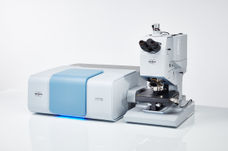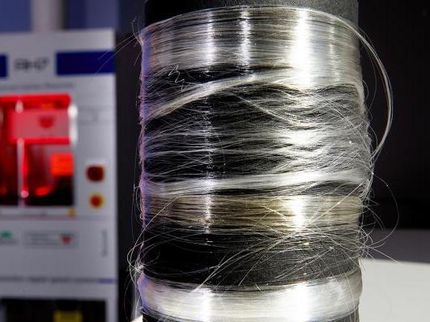Biodegradable, paper-based biobatteries
Easy to produce, low-cost, flexible and more efficient
The batteries of the future may be made out of paper. Researchers at Binghamton University, State University at New York have created a biodegradable, paper-based battery that is more efficient than previously possible.

Researchers at Binghamton University, State University at New York have created a biodegradable, paper-based battery that is more efficient than previously possible.
Seokheun 'Sean' Choi
For years, there has been excitement in the scientific community about the possibility of paper-based batteries as an eco-friendly alternative. However, the proposed designs were never quite powerful enough, they were difficult to produce and it was questionable whether they were really biodegradable.
This new design solves all of those problems.
Associate Professor Seokheun "Sean" Choi from the Electrical and Computer Engineering Department and Professor Omowunmi Sadik from the Chemistry Department worked on the project together. Choi engineered the design of the paper-based battery, while Sadik was able to make the battery a self-sustaining biobattery.
"There's been a dramatic increase in electronic waste and this may be an excellent way to start reducing that," said Choi. "Our hybrid paper battery exhibited a much higher power-to-cost ratio than all previously reported paper-based microbial batteries."
The biobattery uses a hybrid of paper and engineered polymers. The polymers - poly(amic)acid and poly (pyromellitic dianhydride-p-phenylenediamine) - were the key to giving the batteries biodegrading properties. The team tested the degradation of the battery in water and it clearly biodegraded without the requirements of special facilities, conditions or introduction of other microorganisms.
The polymer-paper structures are lightweight, low-cost and flexible. Choi said that flexibility also provides another benefit.
"Power enhancement can be potentially achieved by simply folding or stacking the hybrid, flexible paper-polymer devices," said Choi.
The team said that producing the biobatteries is a fairly straightforward process and that the material allows for modifications depending on what configuration is needed.
Original publication
Other news from the department science
These products might interest you

Eclipse by Wyatt Technology
FFF-MALS system for separation and characterization of macromolecules and nanoparticles
The latest and most innovative FFF system designed for highest usability, robustness and data quality

HYPERION II by Bruker
FT-IR and IR laser imaging (QCL) microscope for research and development
Analyze macroscopic samples with microscopic resolution (5 µm) in seconds

Get the chemical industry in your inbox
By submitting this form you agree that LUMITOS AG will send you the newsletter(s) selected above by email. Your data will not be passed on to third parties. Your data will be stored and processed in accordance with our data protection regulations. LUMITOS may contact you by email for the purpose of advertising or market and opinion surveys. You can revoke your consent at any time without giving reasons to LUMITOS AG, Ernst-Augustin-Str. 2, 12489 Berlin, Germany or by e-mail at revoke@lumitos.com with effect for the future. In addition, each email contains a link to unsubscribe from the corresponding newsletter.
Most read news
More news from our other portals
Last viewed contents
Fuchs Petrolub announces a change in the guard of its Supervisory Board in 2011
CCNY-led team develops non-toxic oil recovery agent - Could have applications to Gulf of Mexico spill
BASF completes sale of Wibarco
BASF starts first MDI production in Chongqing
Method stabilizes, enhances phosphorene
Measurement of Aldehydes and Ketones - Guideline VDI 3862: Gaseous emission measurement
Merger control authorities approve acquisition of Ciba by BASF - Settlement conditions for tender offer fulfilled
David Nicholson to leave Bayer CropScience - Adrian Percy announced as New Head of Research and Development

Michael Siekiera joins management board at Hahnemühle

Desalination with nanoporous graphene membrane





























































